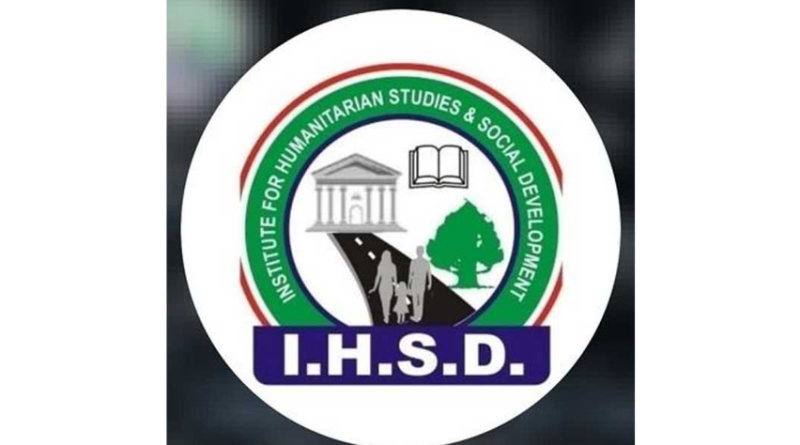Institute certifies 100 humanitarians, urges FG to tackle violence through inclusive governance
The Institute for Humanitarian Studies and Social Development (IHSD) has called on the federal government to embrace inclusive governance as a strategic approach to reducing violence and civil unrest across the country.
Francis Origa, IHSD’s registrar and chief executive officer, stated this during the 15th Annual Humanitarian Public Lecture and Pan-African Humanitarian Leadership Award (TPAHLA) in Abuja.
Origa emphasised that marginalisation and unequal treatment remain key drivers of violence and civil unrest across the country.
Origa underscored that the path to lasting peace and national development lies in meeting citizens’ expectations and valuing human life.
He pointed out that the lack of equitable treatment and meaningful participation in decision-making processes fuels agitation and societal division.
He urged the government to fulfill its responsibilities by fostering fairness and inclusivity in governance. “Social justice and inclusion are not optional they are essential for unity and stability.
“The current lack of fairness in representation and decision-making is deepening the country’s divides,” he said.
He further criticised the top-down approach to policymaking, noting that many policies reflect the personal interests of political elites rather than addressing the needs of ordinary citizens.
He appealed to leaders to be more compassionate and adopt a governance model rooted in humanitarian values.
“Let the poor breathe,” he said, adding that leaders should adopt what he described as a “humanitarian faith” one that treats human dignity as a cornerstone of governance.
Origa also encouraged Nigerians to embrace a culture of empathy and solidarity.
He stressed that humanitarian support doesn’t always require money; small acts of kindness, encouragement, and emotional support can make a significant difference.
“Nigerians need to move beyond sympathy to empathy. If someone around you is struggling, your words or presence might be all they need,” he added.
Speaking on the purpose of the event, Origa said it marked both the International Day for Disaster Reduction and the International Day of the Girl Child.
The lecture served as a platform for experts from government agencies, development institutions, and humanitarian organisations to explore pressing challenges and generate solutions.
According to him, the theme centered on enhancing African security and governance through humanitarian principles and building strong, responsive institutions guided by ethical leadership.
He disclosed that 100 individuals were certified as professional humanitarians after completing courses, exams, and practical training.
Additionally, more than 35 people were inducted as distinguished humanitarian fellows and honorary special ambassadors — a recognition reserved for those with a proven record of impactful humanitarian service and commitment.
Origa explained that applicants must first register, participate in training, pass evaluations, and demonstrate a commitment to humanitarian values before receiving certification.
Describing the public lecture as a vital meeting ground for key players in humanitarian and development fields, he said it was aimed at voicing concerns about societal issues affecting human welfare and survival.
The event’s chairman, former Kaduna State Governor Alhaji Mukhtar Yero, highlighted the importance of effective communication and humanitarian service. He thanked God for the success of the programme and congratulated the graduating cohort.
Ayodele Olawande, Minister of Youth Development, urged young Nigerians to engage in humanitarian work as a pathway to meaningful recognition and national development.
“The more we serve others, the more we contribute to building our country. Don’t just wait on the government be part of the solution,” he said.
Also speaking, Zubaida Umar, Director-General of the National Emergency Management Agency (NEMA), represented by Director of Special Duties, Fatima Kassim, emphasised the vital link between humanitarian leadership, effective governance, and conflict prevention.
She noted the importance of strong partnerships in enhancing disaster readiness and promoting sustainable growth.
Adamu Ibrahim, President and Chairman of IHSD’s Governing Council and former Nigerian Ambassador to Guinea, used the occasion to welcome Bokchara Malanyaro as an honorary executive adviser to the council, recognising his contributions to humanitarian.
Read also: Nigeria’s hunger crisis deepen, ranked 115th in Global Hunger Index
The event concluded with the unveiling of the Pan-African Humanitarian Response Centre, the graduation of newly certified humanitarian professionals, and the formal induction of new humanitarian fellows all part of IHSD’s efforts to strengthen the continent’s humanitarian and development landscape.
The event, held in collaboration with the United Nations Institute for Training and Research (UNITAR), CIFAR Nigeria, the Institute for Peace and Conflict Resolution, and the African Refugees Foundation, focused on the theme: “Humanitarian Leadership as the Compass for Africa’s Future: Bridging Power, Policy, and People for Peace, Prosperity, and Planet.”

